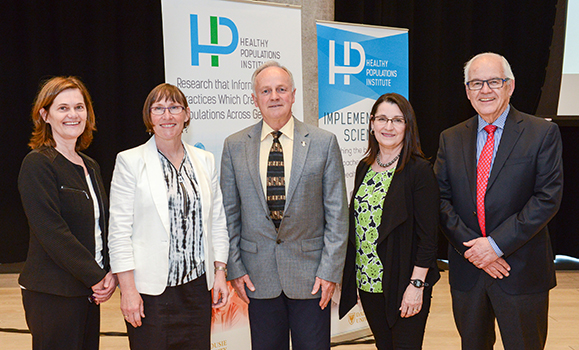More than a hundred health researchers, students, professionals and community members gathered on May 17 to celebrate the launch of Dalhousie’s Healthy Populations Institute (HPI).
MC’d by Scientific Director Lois Jackson, the event introduced the refreshed vision of the former Atlantic Health Promotion Research Centre. Established in 1993, the centre aimed to build and connect a community of researchers focused on addressing health promotion and illness prevention issues in Atlantic Canada.
Fast forward 20 years and the institute has grown to include academic members from a wide variety of disciplines and health professions, partnerships with a growing number of stakeholders from across Canada and the world, and projects addressing disease and illness prevention and health promotion issues seen locally and globally.
“The transition to HPI is about recognizing the significant growth we’ve seen as a research institute and redefining our vision of who we are and what we aim to accomplish,” says Jackson. “We are re-affirming our commitment to research that can actually make a difference in improving the health and well-being of individuals and communities — in Nova Scotia, Atlantic Canada and beyond.”
“The launch of HPI is the culmination of a collaborative, forward-focused review of our accomplishments and opportunities,” says Managing Director Maureen Summers. “We are moving forward with a clear mandate and research objectives.”
A broadened scope
HPI has defined four areas of focus around understanding and promoting the conditions necessary for healthy populations: Indigenous Health and Wellbeing, Youth and Healthy Aging, the Health of Marginalized Populations, and Implementation Science.
“By concentrating on creating impacts at the population level, HPI can have a measurable impact on reducing health inequities,” says Will Webster, dean of the Faculty of Health Professions. “This re-focusing of HPI’s mandate honours the history of the institute while providing an exciting vision for future research.”
While its broadened scope will encourage new partnerships and research outside the Atlantic region, HPI will continue to address health issues facing Nova Scotians.
“Evidence-based research and collaboration needs to inform policy and how we can have a healthy province,” says Nova Scotia Health and Wellness Minister Leo Glavine, who spoke at the celebration. “We need to consider how income, education and other social determinants of health impact how we create a healthier province.”

From left: HPI Scientific Director Lois Jackson, FHP Associate Dean Cheryl Kozey, Health and Wellness Minister Leo Glavine, HPI Managing Director Maureen Summers and FHP Dean Will Webster.
The institute is well-positioned to tackle pressing health issues in part through its partnerships. HPI has close ties with community groups; active partnerships with government, the Nova Scotia Health Authority and Nova Scotia Health Research Foundation; and high profile senior scholars including Sara Kirk, Canada Research Chair in Health Services Research, and Michael Ungar, Canada Research Chair in Child, Family and Community Resilience.
With a slate of up-and-coming early-career scholars, highly productive senior and associate research scholars, accomplished postdoctoral fellows and a growing number of associated graduate students joining its ranks every year, HPI is poised to make significant contributions to how we understand and support the conditions for healthy populations and healthy lives for years to come.
For more information on the Healthy Populations Institute: dal.ca/hpi

